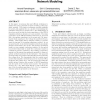Free Online Productivity Tools
i2Speak
i2Symbol
i2OCR
iTex2Img
iWeb2Print
iWeb2Shot
i2Type
iPdf2Split
iPdf2Merge
i2Bopomofo
i2Arabic
i2Style
i2Image
i2PDF
iLatex2Rtf
Sci2ools
113
click to vote
ISPD
2007
ACM
2007
ACM
Accurate power grid analysis with behavioral transistor network modeling
In this paper, we propose fast and efficient techniques to analyze the power grid with accurate modeling of the transistor network. The solution techniques currently available for power grid analysis rely on a model of representing the transistor network as a current source. The disadvantage of the above model is that the drain capacitance of the PMOS transistors which are already on is not modeled. The drain capacitance of the PMOS transistors which are on, act much like a decoupling capacitance in the power grid. By ignoring the drain capacitance, the voltage drop predicted is pessimistic. This implies that a designer is likely to overestimate the amount of decoupling capacitance needed. In our proposed model, we model the transistor network as a simple switch in series with a RC circuit. The presence of switches leads to a non-constant conductance matrix. So, the switch is modeled behaviorally to make the conductance matrix a constant in presence of switches. The resulting conducta...
Related Content
| Added | 26 Oct 2010 |
| Updated | 26 Oct 2010 |
| Type | Conference |
| Year | 2007 |
| Where | ISPD |
| Authors | Anand Ramalingam, Giri Devarayanadurg, David Z. Pan |
Comments (0)

